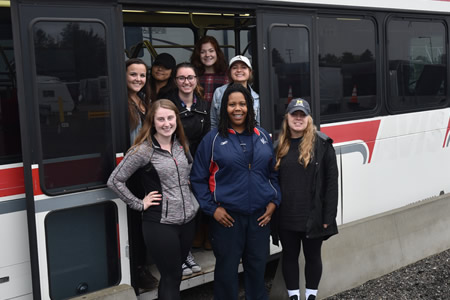Under the high ceilings of a University of Michigan Stamps School of Art & Design classroom, surrounded by a semi-circle of design, accounting, and law students from U-M, entrepreneur and lifelong Detroiter Achsha Jones is reviewing dozens of sticky notes with name suggestions, and sorting them into “yes,” “no” and “maybe.”
The students have absorbed Jones’s vision for her “bustaurant”—the 44’ commercial transit bus she bought last year to bring Detroit—sourced ready-to-eat food to the workers of Detroit—and they think she needs a new name for her company. The new name should still hint at the essence of what the business does, but should communicate more of Achsha’s warmth and personality, Stamps School professor Hannah Smotrich suggests.
The bus is central to Jones’s plan to deliver a taste of Detroit to the city’s manufacturing facilities and industrial parks located in Detroit suburban food deserts, where workers’ only choices are to brown bag it, eat from a vending machine, or rush to buy fast food. Jones’s previous corporate career with Cintas has given her the contacts, knowledge, and experience to set up the routes and vendor relationships—but first she faces the seemingly insurmountable hurdle of preparing the bus.
 |
To be able to franchise the concept later, it should not be a Detroit-centric name. The law students chime in from time to time to vote down names that would not be protectable as trademarks. One of the accounting students asks how much the quote was for the wrapping of the bus, and then suggests the students free-hand it instead. It is not an entirely selfless offer: the design students have wanted to get their hands on that bus since they first heard of it.
Over the course of the afternoon, Jones narrows the choices to four, which the law students vet; a few weeks later, Jones reviews her student-advisors’ recommendations and makes a choice. Lunch Brake (formerly Lunch Stop) is born.
Meanwhile, in Detroit’s Bagley neighborhood, Detroit Sip’s colorful coffee tables paint the backdrop to a warm coffee shop and community space. Jevona Watson, the owner, built the shop with her neighbors in mind, focused on providing the kind of community gathering place she enjoyed studying in as a law student.
Initially, Watson organized ‘speakeasies’ and facilitated community discussions, filling the building with life even before it was open for business. When Detroit Sip held its grand opening in November 2017, the mostly-invisible fingerprints of University of Michigan students were all around—from the posters and tables to the carefully-researched point of sale system used to accept credit cards and the pricing of the food and adjoining conference room space.
Although they don’t get national headlines, neighborhood-based businesses in Detroit—such as Lunch Brake and Detroit Sip—have been fueling the city’s rebirth. But intersectional barriers such as lack of access to credit or capital for low- or moderate-income business owners have limited some areas of innovative growth in the city, especially for minority-owned businesses.
Enter the Detroit Neighborhood Entrepreneurs Project (DNEP), which pairs Detroit small businesses with teams of students from the Law School, Ross School of Business, Stamps School of Art & Design, and the Ford School to help businesses overcome barriers to growth and profitability.
“The Detroit Neighborhood Entrepreneurs Project is collaborative, interdisciplinary, engaged learning” explained Ford School Dean Michael Barr. To launch DNEP, Barr worked with a team of faculty from across the University, including Stamps Professor Hannah Smotrich, Michael Gordon of the Ross School, and Alicia Alvarez from Law, soon bringing in other key faculty that have strengthened the program. Barr has researched issues related to minority entrepreneurship, banking law, and financial inclusion for more than 25 years. “Entrepreneurs allow Michigan faculty and students access to the inner workings of their businesses, while faculty and staff reciprocate with pro bono legal, accounting, business, and design services.”
“Both sides benefit,” Barr notes. “The businesses experience improved operations, customer targeting, and profitability. And students emerge with a more nuanced understanding of the systemic barriers minority entrepreneurs face, the difficulties of launching and operating businesses in Detroit, and direct experience in working with entrepreneurs.”
This partnership has been a dream come true for Achsha Jones. “I feel like I won the lottery,” she said, “I am pretty competent, but I can’t do everything by myself.” University of Michigan Center on Finance, Law and Policy assistant director Christie Baer, who serves as DNEP’s program director, underscores the point: “As a former entrepreneur from a low-income family, I can attest that it doesn’t matter how smart you are, or how hard you work: if you don’t have the money to hire professional advisors and to hire the help you need, it’s easy to get swept into the daily grind of working in your business instead of working on your business.”
Now in its third semester, DNEP has begun integrating Ford School of Public Policy students into the program. Over the last year, Anna Zinkel (MPP ’19) conducted an evaluation of Detroit’s entrepreneurial ecosystem to identify gaps where small business owner needs are not being met. The results of that work helped lead to an expansion of DNEP to include two new initiatives: a workshop series on legal issues for small business owners, and free accounting walk-in hours at the U-M Detroit Center on Fridays, staffed by U-M accounting students.
“I came to graduate school to develop a deeper understanding of workforce development and social policy, and so I am thrilled to be able to work on DNEP,” says Zinkel. “Having the chance to contribute to the growth of a program that provides direct assistance to residents of my home state is one of the reasons that I love the Ford School.”
 |
--Story by Leanna Campos
Below is a formatted version of this article from State & Hill, the magazine of the Ford School. View the entire Spring 2018 State & Hill.